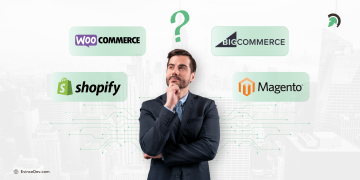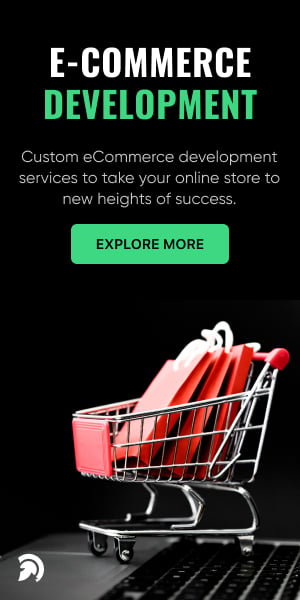Listen to The Most Important Information related to Shopify vs Shopify Plus: Which is the right one for you? through our Blog’s Podcast!!
In 2019, Shopify revealed that the company had more than 1,000,000 businesses in around 175 countries, which is a huge number. In the meantime, there are over 7,000+ live websites that utilize Shopify Plus. Where eCommerce platforms are concerned, there is no question that Shopify and Shopify Plus deliver a user-friendly, transforming platform at a considerable pace. In numerical terms, by the end of last year, their sales increased by 60 percent without any signs of slowing. Current business at the enterprise level wants a more efficient platform for running huge business. That is why Shopify Plus is the best choice.
The greatest advantage of Shopify is versatility in its plan. There is an option for any budget with Shopify packages that cater to the new eCommerce entanglement to that established business.
But how to choose the one that suits your business goals and budget?
We have the inside scoop on Shopify vs. Shopify Plus, whether you’re looking to upgrade your existing package or launch a new online store. Within this blog, we highlight key comparison features for Shopify packages.
Shopify eCommerce: Shopify offers all you need to establish and sell your online store. Log in to the Administration area using your staff account. You can create your eCommerce web site from there, then handle and approve credit card orders.
A) Add products and manage your inventory: You can upload your products, upload their images, set stock rates, and much more to create the inventory of your e-commerce website. You can provide details of the product, and add the weight, maker, height, color, and other details of the product.
Paired with Shopify’s order tracker, the inventory editor makes the control of your inventory easy. You can also add your products one at a time or import all products from an Excel or CSV file, eBay, or Magento file.
B) Organize your product: Shopify helps you in organizing your products. This means you can sort the products that you sell online into the categories that are called collections. You might, for example, place all of your t-shirts and sweaters in “clothing collection,” while still putting some of the same t-shirts in “sales collection.”
C) Content management system (CMS): With a content management system (CMS) feature, Shopify makes it easy for you to create new web pages.
Shopify comes with built-in blog tools. This means you can create a new blog or import an existing WordPress blog to Shopify.
Features and Functionality: Here are the additional features you can expect from Shopify and Shopify Plus.
1. Themes and design flexibility: There are 73 themes available on both Shopify and Shopify Plus. Keep in mind that apart from 9 free themes, prices for the majority of the themes range from $140-$180.
Shopify enables you to modify the theme and use Liquid-an open-source template language for HTML or CSS editing. This means that to make the custom edits you need a clear understanding of liquid coding. Don’t worry, you’re still primed for step-by-step guidance. Additionally, there are many themes available in multiple languages. And if you want to create an online store for a targeted audience in a particular country, you can do it with various languages like Brazilian Portuguese, English, Spanish, French, German, Italian, and Japanese. Customers prefer to stick with their native languages on the website for longer because they can easily explore the website, provide products or services.
However, with the aid of Shopify Plus, Launch management is accountable for writing code and allowing custom editing for you. In this scenario, a dedicated Launch Manager will save hundreds of dollars and a lot more time to businesses at the enterprise level.
Another benefit of Shopify Plus is that it allows you to use the Script Editor to customize your checkout page which is not featured with other Shopify plans. Mentioned as tiny pieces of code, Shopify Scripts allows you to make customized experiences in your cart and at checkout for your customers. Three types of scripts including Line item scripts, Shipping scripts, and Payment scripts can be created.
The customized checkout page will offer your customers a more amazing experience on your website.
Shopify Plus also allows merchants to use the checkout page to launch bot challenges. When you enable this, customers will be asked to show that they are human before buying their products. Bot challenges are necessary to avoid robots or clicking on opponents when you stage an online activity.
2. Service/Support: In Shopify, you get 24/7 Technical Support via email, phone, and live chat. However, in Shopify Plus you get 24/7 Priority Technical Support via email, phone, and live chat. Shopify also offers Dedicated Launch Manager, Dedicated Merchant Success Manager (reactive + proactive support).
3. Platform Tools: In Shopify, you get an online store with 73 and paid-for themes, blogging capabilities, 15 staff accounts, unlimited products, unlimited storage, fraud analysis, manual order creation, discount codes, gift cards, reports, email notification templates, customer accounts, abandoned cart recovery, carrier-calculated shipping, integration to 70+ payment gateway.
Shopify Plus offers you all tools found on Shopify advanced plan, unlimited staff accounts, unlimited bandwidth, unlimited transactions, 99.9 percent uptime, custom checkout SSL certificate, check out liquid access to customize the checkout (CSS, HTML, JS), access to exclusive API’S, discount API’s, gift card API, multipass/SSO, increased API calls, discount scripts – for customer promotions, shipping scripts – for customer shipping options, avalara avatax integration, wholesale/b2b functionality, and more.
4. Wholesale, Social Selling, and Launchpad: Through having a separate storefront which is an extension of your online store, the Wholesale Channel helps you to expand your business into wholesale. You can then monitor all your customers and orders on wholesale under the Shopify administrator of your current store. You can’t sell wholesale through standard Shopify.
Additionally, you can use Shopify Plus to sell your products directly to social media and online marketplaces, such as Facebook, Twitter, Pinterest, eBay, Amazon, and many more. You can sell on more than one distribution platform using Shopify, attracting a range of audiences. You can keep track of your products, orders, and customers all in one place by connecting every sales channel to Shopify.
Shopify Plus introduced an exclusive feature called Launchpad. Launchpad allows you to schedule, coordinate, and execute events, such as sales, product drops, and inventory restocks. As an event progresses, you can track its success by viewing the app’s real-time, analytic dashboard.
5. Better Integrations and Reporting: Connect to systems from third parties, such as Netsuite, Microsoft Navision, Salesforce, and more. Unlimited access to the Shopify API and higher performance on the Plus API. It is also important to remember that the Shopify API standard restricts you to 2 API calls per second while the Plus API does not have this limit.
Shopify Plus offers you access to your team to make and offer custom reports and analytics. The fundamental eCommerce metrics that issue most to you can be given priority and focused. SDK’s (software development kits) implies you can without much of a stretch make custom applications and solutions with Shopify Plus, such as kiosks to smartphone devices in-store and more.
You can choose from four different Shopify packages.
- Shopify Basic: Best fit for minimal budget and/or experience eCommerce entrepreneurs with just a few products.
- Shopify (Standard): Suitable for someone who is working to expand a business that can expand and needs something that can handle hundreds of products.
- Advanced Shopify: Offers unlimited features so you can scale up your business.
- Shopify Plus: A unique pricing platform designed for existing store owners seeking for exclusive features and support for their wider brand.
The higher amount you pay, the more helpful features you get in Shopify, including professional reports, advanced report builders, or shipping rates measured by a third party. These features will encourage the management of your business. Be that as it may, while picking the right package for your business, the cost ought to be your last concern – especially in the event that you have enormous business objectives.
The Shopify Plus transaction fee can be resolved by the number of your sales and the productivity of your store. For Shopify Payments, you will pay 2.15 percent + $0.30 for every household Visa and MC exchange in the United States. You should pay an extra 1 percent charge for AMEX and universal cards. Certain gateways for o3rd party payment, for example, PayPal, 2Checkout, Skrill, can charge you 0.15 percent extra expense. It would be ideal if you notice that the fees vary according to the country.
Magento vs Shopify Plus: Magento is, without question, the lord of on-premise eCommerce. It also holds serious value in the eCommerce space when it comes to complex requirements and scalability. Be that as it may, the world is changing with SaaS and eCommerce is no special case. Most businesses are searching for a superior, more available course to awesome on-scale customer experiences.
Shopify Plus is modernizing in the manner business dealers explore a trade. It empowers retailers to move their spending plans and human capital away from costly framework and improvement and to concentrate on significant issues, for example, strategy, customer engagement, social influence, and data-led marketing.
Magento additionally needs installation, setup, and configuration. In a disseminated architecture, that is challenging. A huge part of every execution of Magento is focused on guaranteeing consistency and versatility, instead of focusing on your core needs.
Shopify Plus clients profit by the immense framework of Shopify. Shopify Plus gives high-growth, high-volume merchants with the ease of use, effectiveness, and adaptability they need, without all the intricacies, extensive postponements, and on-location execution costs.
Conclusion
Given the upgraded functionality and features, Shopify Plus is likely the most impressive platform for your degree of business. While evaluating the pros and cons of Shopify ‘s plans, don’t forget to consider the eCommerce business giants, Shopify Plus, that will rapidly boost sales and enhance the store management process with all the comprehensive features. Shopify Plus is sure to relieve all your workload pressure while you’re running a business.
You need to begin by deciding at which stage your retail business is in. Is it accurate to say that you are actually quite unassuming, or an endeavor? The features and functionality you need, contingent upon the plan, as the higher the arrangement you select, the more flexible the tool you will have the option to utilize. Shopify is focused on little and medium-sized businesses while Shopify Plus is for high-volume merchants and huge businesses.
In case you’re a new merchant, for instance, one of the standard Shopify plans will be an ideal method to start. At that point, you can generally move up to Plus to scale and grow as you gain certainty. Yet, in case you’re a high-volume proficient or prepared retailer, Shopify Plus will be the best other option, with the entirety of its extra highlights and bolster that empower you to work your store to its most noteworthy ability while as yet sparing you important time.
If you are thinking of starting an online business store, you can hire a Shopify Expert who is professionally experienced designers, developers, and consultants specializing in creating popular brands, businesses, and Shopify stores, of course. Before joining the marketplace every expert is verified. They ‘re not employees at Shopify; they ‘re entrepreneurs who see Shopify ‘s value and aid other entrepreneurs. Regardless of whether your activity is small or enormous, you have to do it accurately. There are several professionals with the essential abilities to return to business.




